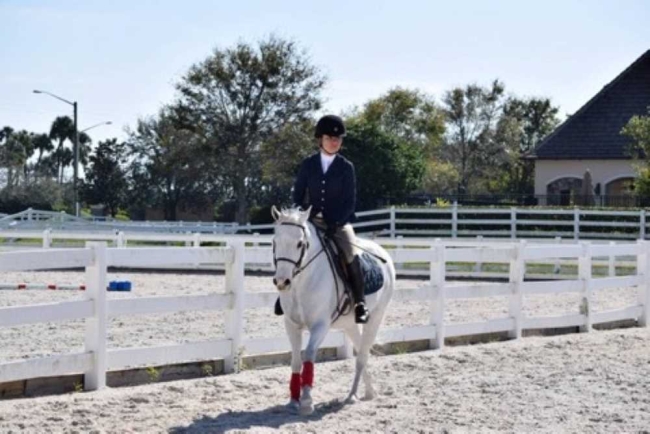You have /5 articles left.
Sign up for a free account or log in.

Lauren Reischer, co-captain of the Brown University equestrian team.
Liz Rao
Advocates for gender equity in college sports were satisfied when Brown University agreed in 1998 to maintain a strict proportion of women’s and men’s athletic teams.
The agreement, which was part of a settlement of a lawsuit filed by female athletes at the university, was designed to promote gender equity in sports at the private Rhode Island institution. Advocacy groups believe the settlement has mostly done so during the past 22 years.
 But university administrators recently described the settlement as “pestilential” and privately discussed ways to get out of it, according to internal emails made public in Rhode Island district court last week. Brown had recently eliminated 11 varsity sports teams -- five for women and six for men -- and faced backlash from the athletes and alumni for the decision. The emails show President Christina Paxson and Chancellor Samuel Mencoff exchanged ideas in early June, immediately after the cuts, about how to turn the criticism of the university’s Excellence in Brown Athletics Initiative into criticism of the court for upholding the settlement.
But university administrators recently described the settlement as “pestilential” and privately discussed ways to get out of it, according to internal emails made public in Rhode Island district court last week. Brown had recently eliminated 11 varsity sports teams -- five for women and six for men -- and faced backlash from the athletes and alumni for the decision. The emails show President Christina Paxson and Chancellor Samuel Mencoff exchanged ideas in early June, immediately after the cuts, about how to turn the criticism of the university’s Excellence in Brown Athletics Initiative into criticism of the court for upholding the settlement.
Brown officials were under pressure to specifically reinstate men's track and field and cross country. Restoring the three teams, however, resulted in claims that the university cut too many opportunities for women and did not comply with the 1998 settlement.
“Could we use this moment, where anger and frustration, especially from track and squash, are intense and building to go after the Consent Decree once and for all?” Mencoff wrote, referring to the settlement. “Could we channel all this emotion away from anger at Brown at the court and kill this pestilential thing? The argument would be that the Consent Decree is forcing us to eliminate these sports, and the court would then be bombarded with emails and calls as we are now.”
Paxson responded that “it’s a good idea.” But in a message to Mencoff days later, on June 9, she wrote that the university would not explicitly state its “intention to fight” the settlement. She also announced that day that men's track and field and cross country would be reinstated.
“Our concern is that this could rile up the Cohens of the world and put us in a defensive posture,” Paxson wrote, referring to Amy Cohen, the female athlete who originally led a class-action lawsuit against Brown in the 1990s and argued that cuts to two women’s and two men’s teams discriminated against women.
The emails were released as a result of a legal filing on June 29 by the American Civil Liberties Union of Rhode Island and Public Justice, a legal advocacy group, both of which initially fought Brown’s athletics inequalities in the Cohen lawsuit. The organizations claim the university’s new sports structure violates the 1998 agreement, which mandates that Brown maintain a 3.5 percent variance between the percentage of undergraduate women enrolled at the university and athletics opportunities available on campus for women. If the university eliminates any women's sport, the variance of undergraduate women to female athletics drops to 2.25 percent, according to a university webpage about the athletics initiative.
“When we filed the motion to enforce the Court’s order in June, we expressed concern that Brown’s commitment to gender equity and its women athletes was insincere and simply window-dressing,” Lynette Labinger, cooperating counsel for the ACLU of R.I. and the lead attorney in the original suit said in a press release. “Through discovery, we learned the unfortunate truth: Brown does not care. Brown would rather dismantle the entire process that it claims prompted the downsizing than provide its women athletes -- its own students -- the program required by law and by the Court’s order.”
No other institution in the country must meet such “inflexible constraints” for female athletics opportunities under Title IX of the Education Amendments of 1972, the law prohibiting sex discrimination at federally funded institutions, Brian Clark, Brown’s assistant vice president for news and editorial development, said in an email.
The email chain between administrators included a comparison of the athlete-to-undergraduate variance at Brown to those of other Ivy League institutions during the 2018-19 academic year. The comparison showed the University of Pennsylvania had a 10.8 percent variance and Cornell University had 7.9 percent, the two highest in the league, compared to Brown’s 2.6 percent, according to an analysis completed by the university’s athletic department.
Clark contends that the ACLU of R.I. and Public Justice are resorting to “rhetoric and invective” through their press release and publicizing the administrators' emails to support their case because the facts do not support it. Brown will be modifying its roster sizes for the remaining sports “to remain in compliance with the requirements of the legal settlement and with Title IX for the moment,” he wrote in the email.
“Brown has an exemplary record of providing varsity athletic opportunities to women, with a record that stands near the top among its peers,” Clark wrote. “We remain confident that the federal court judge, who, unlike plaintiffs, will apply the language of the consent decree and basic principles of contract law, will agree.”
Audrey Anderson, counsel at the law firm Bass, Berry & Sims and former general counsel for Vanderbilt University, said the requirement Brown agreed to as part of the settlement to the lawsuit is a “really tight fit” compared to other institutions. Under Title IX, colleges have multiple ways of proving their athletic opportunities are compliant, one of which is to show athletic programming for women and men is “substantially proportionate to their overall enrollment” with no specific number to hit, Anderson said.
But Brown agreed to such a narrow variance to settle the 1992 lawsuit, and the university is now bound to it unless it can convince the district court, ACLU of R.I. and Public Justice to renegotiate, Anderson said. The agreement may have looked like a good idea at the time, but it has now become “operationally inconvenient for Brown,” she said.
“Not every school is complying in the same way that Brown’s consent decree is set up,” she said. “They’re in that position because they were sued in the 1990s. The way that they chose to make that lawsuit stop was to agree to that narrow band. They could’ve continued to fight the lawsuit. No one made them agree to that.”
Clark contends that the university “is not seeking to terminate the consent decree at this time” but that officials believe the agreement “has outlived its usefulness.”
“The current thinking among federal courts today is that consent decrees, like the Cohen agreement, that have no end date, are not advisable,” he wrote. “The resources being spent on the current proceeding, which could have been spent on improving the experience of our student-athletes, only highlight that fact.”
Anderson said Brown may have had success renegotiating the 1998 settlement if it had approached the court and argued the agreement is no longer necessary before deciding to eliminate the women’s sports teams. Now it may appear like the university is “trying to take away rights of the class you’re trying to protect.”
The email exchange in which officials expressed frustration with the requirement was also not advisable, she said.
“When you’re a lawyer, you always tell your clients, ‘Don’t put stuff in emails that you don’t want written about in The New York Times,’” Anderson said. “Especially if you’re a prestigious university.”
The agreement was largely unknown to current female athletes at Brown until the university decided in May to cut five women’s varsity sports: equestrian, golf, skiing, fencing and squash, said Lauren Reischer, a senior and co-captain of the equestrian team. She said all she knew of the settlement and Brown Athletics’ compliance with Title IX was that the all-women equestrian team fulfilled a need for more female athletes.
“Now I feel like I know everything,” Reischer said. “After the cuts, we obviously knew that there were going to be Title IX issues.”
Since the team was downgraded from varsity status, Reischer and other women’s team captains have provided personal accounts for the court filed by the ACLU of Rhode Island and Public Justice in an effort to get the teams reinstated. After initially feeling “betrayed” by Brown’s cuts at the end of May, Reischer said the administrators’ emails released last week discussing turning blame to the courts were “extremely hurtful” and “manipulative.”
“Instead of dealing with the repercussions of making such a secretive decision, instead of working with students, that they would try to deflect blame, it was really disappointing to see that,” she said. “It’s making it somebody else’s problem, as if we were a burden to them after we were the ones cut.”
Reischer said the settlement was Brown’s “way out of a sticky legal situation” and the university has the responsibility to uphold that obligation, no matter if it is a higher standard than other colleges. She believes the university is also obligated to retain opportunities for athletes because it created the teams in the first place. The release of the emails could ultimately prove to be a positive outcome for the female athletes’ efforts to get their teams reinstated, Reischer said.
“It’s nobody’s fault but their own,” she said. “The release of these emails and reports is in a way good news for us … We feel like it’s a step forward in our united mission to get reinstated.”




